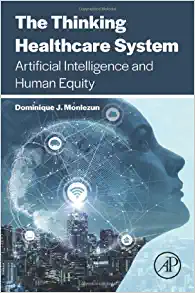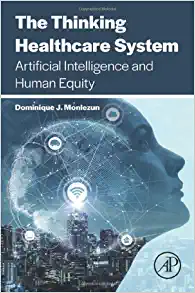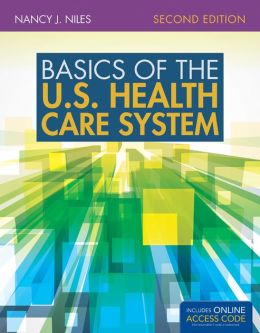-77%
The Future of Healthcare: A Thinking System Driven by AI and Human Equity
Dominique J. Monlezun’s groundbreaking work, “The Thinking Healthcare System: Artificial Intelligence and Human Equity,” is a comprehensive exploration of the transformative trends shaping the evolution of modern healthcare into a futuristic system powered by artificial intelligence. Written by a renowned physician-data scientist and ethicist, this tome delves into the intricate relationship between technology, economics, and ethics in the creation of a healthcare system that prioritizes the well-being of all, regardless of their background or circumstances.
This invaluable resource provides a comprehensive overview of the key components that will define the future healthcare ecosystem:
AI-Accelerated Digital Health Ecosystems: The integration of AI into healthcare systems enables the creation of interconnected platforms that foster collaboration and data sharing, empowering healthcare providers with unprecedented insights and tools to enhance patient care.
Data Architecture: Robust data architecture is the foundation upon which AI-driven healthcare systems operate. By designing and implementing secure and scalable data repositories, healthcare organizations can leverage AI algorithms to extract meaningful patterns and inform decision-making.
Cloud and Edge Computing: The advent of cloud and edge computing technologies allows for the processing and analysis of vast amounts of healthcare data in real-time. By distributing computing power to the edge of the network, AI systems can provide real-time insights and recommendations at the point of care.
Precision Medicine: AI is revolutionizing the field of precision medicine by enabling tailored treatments for each patient based on their unique genetic makeup and lifestyle factors. This approach promises to improve patient outcomes and reduce costs by targeting interventions to those most likely to benefit.
Public Health: AI is transforming the way we approach public health initiatives by providing predictive models that can identify and address health risks at a population level. These models empower policymakers to develop targeted interventions and allocate resources effectively.
Telemedicine: The integration of telemedicine services into AI-driven healthcare systems expands access to healthcare, particularly in underserved areas. Remote consultations and virtual monitoring technologies enable patients to receive timely and convenient care from anywhere, reducing barriers to access.
Patient Safety: AI algorithms can analyze vast amounts of patient data to identify potential risks and adverse events, enhancing patient safety by proactively flagging issues and alerting healthcare providers.
Health Political Economics: The intersection of healthcare and economics is a crucial consideration in the development of AI-driven health systems. This book explores the economic implications of AI in healthcare, including its impact on costs, access to care, and the allocation of resources.
Multicultural Global Ethics: As healthcare systems become increasingly globalized, it is imperative to consider the ethical implications of AI in healthcare across different cultures and societies. This book delves into the complexities of multicultural global ethics and provides guidance on ensuring that AI-driven health systems are equitable and respectful of diverse perspectives.
Blockchain: Blockchain technology offers a secure and transparent way to manage and share healthcare data. Its decentralized nature ensures the integrity and privacy of patient information, empowering patients with greater control over their health data.
Quantum Health Computing: Quantum computing has the potential to revolutionize healthcare by enabling the development of AI algorithms that can process vast amounts of complex data at unprecedented speeds. This technology holds promise for breakthroughs in areas such as drug discovery and personalized medicine.
This groundbreaking book is a must-read for healthcare and business executives, clinicians, researchers, government leaders, policymakers, and students in the fields of healthcare management, data science, medicine, public health, informatics, health and public policy, political economics, and bioethics. It provides a comprehensive roadmap for navigating the complexities of AI-driven healthcare systems and ensuring that these systems serve the greater good by delivering equitable, accessible, and compassionate care to all.
maybe you like these too:
- The Thinking Healthcare System: Artificial Intelligence and Human Equity (Original PDF from Publisher)
- Applied Health Economics for Public Health Practice and Research (Handbooks in Health Economic Evaluation) (Original PDF from Publisher)
- Cloud Computing in Medical Imaging (EPUB)
- Public Health Leadership, 3rd Edition










Reviews
Clear filtersThere are no reviews yet.